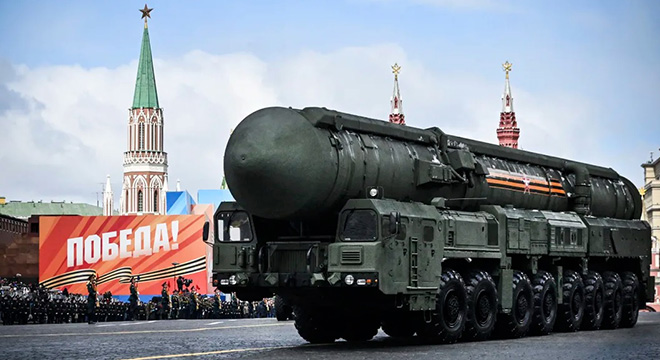 Photo: AFP
Photo: AFP
Vladimir Putin signed an updated version of Russian nuclear doctrine – “Foundations of the State Policy of the Russian Federation in the Area of Nuclear Deterrence”, Sputnik reports.
Earlier Russian officials explained that the update of the Russian nuclear doctrine was necessary due to heightened tensions around Russian borders and nuclear nations supporting Ukraine in its conflict with Russia.
According to the document:
- Deterring potential enemy from aggression against Russia and its allies are among highest state priorities of country.
- Aggression of any state from a military coalition against Russia or its allies is considered as aggression of this coalition as a whole.
- Russian state policy in field of nuclear deterrence is defensive in nature.
- Russia carries out nuclear deterrence against potential enemy: states, blocs and alliances that consider Russia as an enemy.
- Adaptability of nuclear deterrence to military dangers and threats included in foundations of Russian state policy in nuclear deterrence.
- Aggression against Russia or its allies by non-nuclear state with support of nuclear one considered as joint attack.
- Russian state policy on nuclear deterrence aimed at maintaining potential of nuclear forces at level sufficient for nuclear deterrence.
- While Russia considers nuclear weapons a means of deterrence, the use of which is an extreme and forced measure, Moscow may unleash them in case of aggression against Russia or Belarus that creates a critical threat to territorial integrity, as well as in response to the use of weapons of mass destruction.
"The state policy in the area of nuclear deterrence is defensive in nature, aimed at maintaining the potential of nuclear forces at a level sufficient to ensure nuclear deterrence, and guarantees the protection of the sovereignty and territorial integrity of the state, deterrence of a potential enemy from aggression against the Russian Federation and (or) its allies, and in the event of a military conflict – preventing the escalation of military actions and their termination on terms acceptable to the Russian Federation and (or) its allies," the document read.
The policy is also aimed at ensuring that a potential adversary understands the inevitability of a retaliation in the event of aggression against Russia.
Russian nuclear deterrence becomes uncertain for adversaries – potential enemies are unaware of the scope of possible nuclear retaliation and of its place.
Russia’s new doctrine guarantees cessation of military conflicts on terms acceptable to Russia.
Nuances of Russia's Nuclear Deterence
- Data on massive takeoff of air and space attack weapons crossing the Russian border is one of the conditions for determining the use of nuclear weapons.
- The deployment of missile defense systems in space by the enemy is a danger, the neutralization of which calls for Russia to conduct nuclear deterrence.
- Russia sees the deployment of nuclear weapons on the territory of non-nuclear states as the main military danger.
- Nuclear deterrence will be carried out continuously in peacetime, during threats of aggression, in wartime, and until the use of nuclear arms.
- Russia's nuclear deterrent forces include land-based, sea-based, and air-based forces.
- Russia is making all necessary efforts to prevent any escalation that could provoke military conflicts, including nuclear ones.
Reliable information about the launch of ballistic missiles attacking Russia or its allies makes possible the use of nuclear weapons in response.
read more in our Telegram-channel https://t.me/The_International_Affairs

 12:40 19.11.2024 •
12:40 19.11.2024 •






















